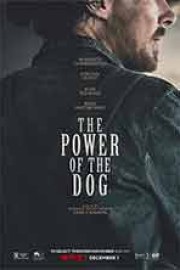The Power of the Dog
**I wrote about Jonny Greenwood’s score for Ripe Banana, which can be read here.
Jane Campion has never shied away from challenging audience perceptions of what a movie, and what a genre, should be like. In making a movie about the American west, she is working within familiar western tropes, even if the timeframe is decades after when most westerns are set in, but also tweaking some ideas to say something about not just the characters, but the culture in which they live in. Some of that is, no doubt, ported over from the novel by Thomas Savage, but the ways the film explores masculinity are very contemporary. At the heart of it, “The Power of the Dog” is about three men who have different ideas of what it means to be a man, and it’s as provocative an exploration on the subject as any we’ve seen.
Phil Burbank (Benedict Cumberbatch) is a cattle rustler whom, with his brother George (Jessie Plemons), has taken over a ranch from his mentor, Bronco Henry. In Phil’s mind, a man in this business is rough and rugged. They eat fried chicken and meat. They don’t bathe. And they don’t make paper flowers for table decorations. That’s what he finds when he and his workers stop for food and lodging at the in run by Rose (Kirsten Dunst), a widow whose son, Peter (Kodi Smit-McPhee), helps her around, and is responsible for the decorations. Phil’s homophobic bullying of Peter sets off the narrative of the film’s story.
George is the money and business side of the ranch. He goes with Phil on the cattle drives, but doesn’t get his hands dirty. For him, being able to sort through any situation diplomatically is the most important part. So when he comes back to Rose’s place and finds her crying because of how Phil’s words hurt Peter, he does the most logical thing and consoles her. That leads to asking her to marry him, sending Peter to school, and moving her to the ranch. It’s the gentlemanly thing to do, but is it what’s best for her?
Peter is what we would derisively call a “mamma’s boy,” or at least, that’s how he starts out. He works with her, helps serve folks who come in, and makes the centerpieces for the table. Of course, the centerpieces and his feminine mannerisms make him a target for homophobia from Phil and a lot of the other rustlers. We understand why he runs away, and we empathize. When he and Rose are intended to move into the ranch, the tension of how this will all turn out is palpable, and not unexpected. Until a shift in behavior by Phil makes us think otherwise.
At the center of all of this masculine posturing, or lack thereof, is Rose. This is not a happy arrangement for her, when George marries her and moves her in. He, naturally, wants to show off his wife to people like the governor and his parents, but it’s uncomfortable for her. He brings in a baby grand piano for her to play, but Phil taunts her with his guitar. Her insecurity leads to drinking, and a mental state that will never really fit in with life on a ranch, even if things might work out for Peter.
I gave each main character their own paragraph because “The Power of the Dog” works best not simply as an exploration of western archetypes, but as a character study centered around toxic masculinity, and one woman for whom it has a damaging effect. Phil is the most obvious offender, with his “old fashioned” way of thinking about what makes a man, but George is guilty of boxing Rose into a corner. Sure, his manner is intended as sincere affection, but it also forces her into situations she is uncomfortable with. Of course, that is a reflection of his own insecurity, just as Phil’s initial behavior is with him. Peter is insecure, as well, but in a way, he’s the most honest about himself when we look at his way of being, even if he hides it. All four actors are terrific at illustrating what Campion wants to show us in these individuals throughout the film, all while creating a vivid, beautiful western landscape.
“The Power of the Dog” has immaculate craftsmanship, namely in the cinematography by Ari Wegner and music by Jonny Greenwood. This is a film of beautiful, powerful images, and one in particular stands out when Phil is trying to teach Peter some of the lessons he learned from Bronco Henry, and they’re looking out at hills by the ranch. Light, shadow and framing are all necessary for the image to have its intended impact, and it does because of how strong of a visual filmmaker Campion is. Greenwood is becoming one of the most sought-after film composers, and he has two distinctive scores out this month, between this and “Spencer.” Because of how he approaches this film, I felt a kinship to “There Will Be Blood” here, but I was nonetheless transfixed by his music for this film, sometimes more so than I was his work for “Spencer.”
This film lingered with me, not just for the vision it represents as a cinematic experience, but as a look at different characters, all of whom are struggling with some piece of their identity. It’s interesting to see how some of them manage to find it compared to how others do.










